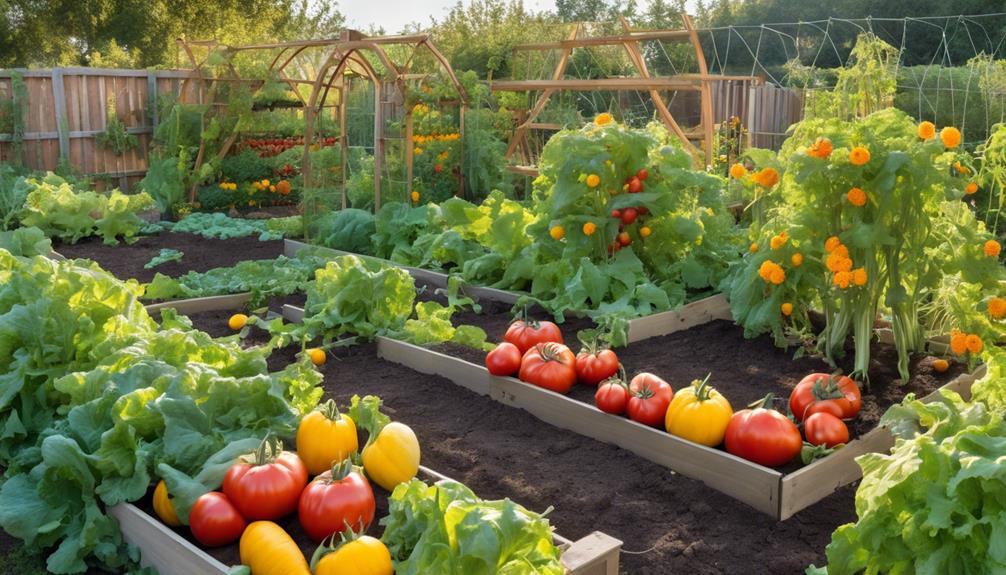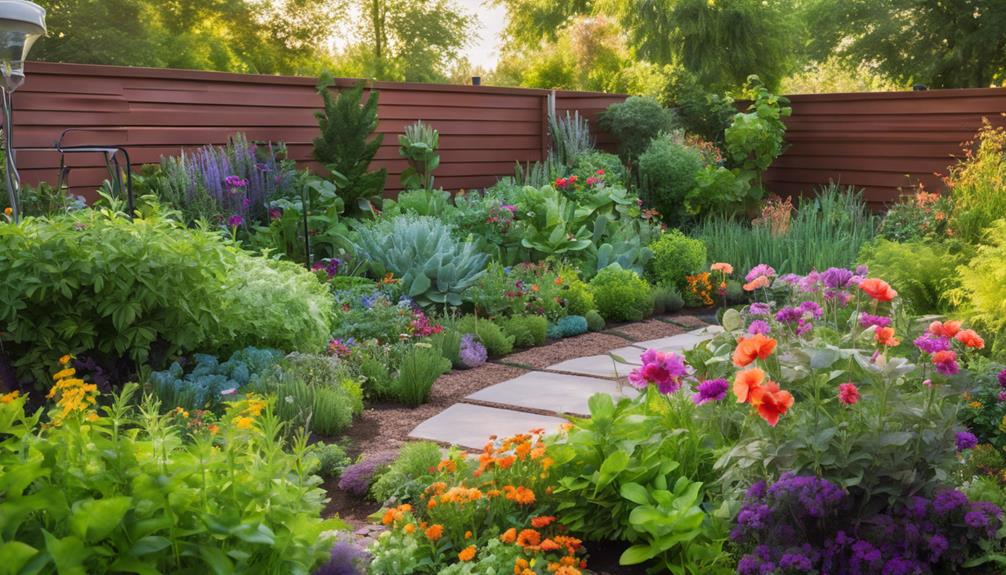
Why Prioritize These Spring Garden Maintenance Tasks?
3 October 2024
10 Tips for Affordable Local Tree Care Services
4 October 2024To ensure a thriving garden, it is essential to avoid these common maintenance mistakes.
Firstly, overwatering can lead to root rot and various plant diseases.
Secondly, neglecting soil health restricts nutrient uptake, making regular testing imperative.
Thirdly, improper nutrient management can hinder growth; use slow-release fertilisers judiciously.
Fourthly, position plants according to their sunlight requirements.
Fifthly, implement proactive pest control strategies to safeguard your plants.
Sixthly, establish a consistent maintenance routine for watering and pruning.
Finally, take environmental factors into account and adopt sustainable practices.
Each of these areas plays a vital role in achieving garden success, and further insights await to enhance your gardening efforts.
Garden Maintenance Pitfalls Explained
Effective garden maintenance requires a keen awareness of common pitfalls that can undermine plant health.
Overwatering plants frequently can lead to root rot and other issues, while neglecting soil health can deprive plants of vital nutrients.
Understanding these factors is fundamental for fostering a thriving garden environment.
Overwatering Plants Frequently
Overwatering plants frequently can lead to a cascade of issues that compromise their health and vitality.
Excess moisture in the soil creates an anaerobic environment, limiting oxygen availability to roots and fostering root rot. This condition can disrupt nutrient uptake, resulting in yellowing leaves and stunted growth.
Moreover, overwatering encourages the proliferation of fungal diseases, which can devastate plant populations.
It is crucial to monitor soil moisture levels closely and adopt a watering schedule that aligns with the specific needs of each plant species.
Implementing proper drainage techniques and utilising moisture sensors can further enhance water management.
Ignoring Soil Health
Soil health is the foundation of a thriving garden; yet many gardeners overlook its critical role in plant success. Neglecting soil quality can lead to nutrient deficiencies, poor drainage, and diminished microbial activity, all of which compromise plant vigour.
To avoid this pitfall, conduct regular soil tests to assess pH and nutrient levels, allowing for precise amendments tailored to your garden's specific needs. Incorporate organic matter, such as compost, to improve soil structure and fertility.
Furthermore, practise crop rotation and cover cropping to prevent soil depletion and erosion. By prioritising soil health, you not only foster a robust garden ecosystem but also guarantee sustainable growth, ultimately leading to a flourishing and resilient landscape.
Soil Quality and Composition
Soil quality and composition are critical factors that directly influence plant health and garden productivity.
Common mistakes include pH imbalances, neglecting the addition of organic matter, and disregarding drainage issues, all of which can significantly hinder growth.
Addressing these aspects is vital for maintaining a flourishing garden ecosystem.
Ph Imbalance in Soil
Achieving ideal plant health hinges greatly on the intricate balance of pH levels in the soil. An improper pH can lead to nutrient deficiencies or toxicities, substantially impacting plant growth and yield.
To ensure optimal soil pH, consider the following:
- Conduct regular soil tests to monitor pH levels.
- Choose plants suited to your soil's pH range for better adaptation.
- Incorporate amendments such as lime or sulphur to adjust pH effectively.
- Monitor irrigation practices, as water quality can influence soil acidity or alkalinity.
Neglecting Organic Matter Addition
In the pursuit of healthy garden growth, neglecting the inclusion of organic matter can severely compromise soil quality and composition.
Organic matter plays a crucial role in improving soil structure, nutrient availability, and overall microbial activity. Without it, gardens can suffer from nutrient deficiencies and poor water retention.
Key reasons to prioritise the incorporation of organic matter include:
- Improved Soil Structure: Enhances aeration and root penetration.
- Nutrient Cycling: Supports the availability of essential nutrients for plants.
- Water Retention: Increases the soil's capacity to hold moisture, thereby reducing irrigation requirements.
- Microbial Activity: Stimulates beneficial microorganisms that promote plant health.
Incorporating organic matter regularly is fundamental for maintaining a thriving garden ecosystem.
Ignoring Soil Drainage Issues
Proper garden maintenance requires attention to diverse factors that influence plant health, including the management of soil drainage issues. Neglecting these issues can lead to detrimental effects on plant vigour and overall garden appearance.
To achieve ideal soil drainage, consider the following:
- Assess soil texture: Determine whether your soil is sandy, clayey, or loamy.
- Implement raised beds: Elevating soil can improve drainage and reduce waterlogging.
- Incorporate organic matter: Enhancing soil structure promotes better aeration and drainage.
- Install drainage systems: Utilise French drains or perforated pipes to redirect excess water.
Addressing soil drainage is crucial for fostering a thriving garden ecosystem.
Soil Testing Techniques
Effective soil testing is crucial for ideal garden maintenance.
Proper soil sample collection techniques, along with regular monitoring of soil pH and moisture levels, can greatly improve plant health and yield.
Soil Sample Collection Techniques
Collecting soil samples accurately is crucial for obtaining reliable test results that inform garden maintenance decisions. Proper techniques ensure that you gather representative samples, which can significantly impact your gardening outcomes.
Consider the following best practices:
- Choose the right time: Avoid sampling immediately after heavy rainfall or during drought conditions.
- Use clean tools: Sterilise your sampling tools to prevent contamination from previous soil types.
- Sample from multiple locations: Collect samples from different spots within the garden to obtain a thorough overview.
- Depth matters: Ensure that you sample at the appropriate depth for the specific plants you intend to cultivate.
Regularly Test Soil Ph
After gathering your soil samples, the next step involves evaluating the pH levels, a vital factor that influences nutrient availability for plants.
Regularly testing soil pH ensures ideal growing conditions and mitigates the risk of nutrient deficiencies or toxicities.
Consider these key aspects when evaluating soil pH:
- Frequency: Test at least once a year for consistent results.
- Methodology: Use reliable methods, such as pH test kits or laboratory analysis.
- Timing: Conduct tests during the growing season for accurate reflections of plant needs.
- Amendments: Be prepared to adjust soil pH with lime for acidity or sulphur for alkalinity based on test outcomes.
Mastering soil pH testing is vital for effective garden maintenance and thriving plant health.
Precision Soil Moisture Monitoring
While understanding soil pH is essential for plant health, precision soil moisture monitoring is equally significant for optimising irrigation and preventing water stress.
Employing accurate moisture measurement techniques ensures that your plants receive the appropriate amount of water, which is crucial for their growth and survival.
Consider these key approaches to enhance your soil moisture strategy:
- Utilise soil moisture sensors for real-time data.
- Implement tensiometers to gauge tension and water availability.
- Conduct regular soil moisture sampling to inform irrigation schedules.
- Analyse moisture retention capabilities of different soil types.
Incorporating these methods not only promotes healthier plants but also conserves water resources, aligning your garden maintenance practices with sustainable horticultural principles.
Enhanced Plant Growth Rates
Enhanced plant growth rates are an important objective for any gardener aiming to cultivate a flourishing garden. To promote growth, it is essential to avoid common pitfalls that hinder plant development. Key factors include proper nutrient management, adequate sunlight exposure, and suitable watering practices.
| Factor | Best Practices |
|---|---|
| Nutrient Management | Use slow-release fertilisers and organic amendments. |
| Sunlight Exposure | Position plants according to their light requirements. |
| Watering Practices | Implement consistent moisture levels without overwatering. |
Pest Control Strategies
Effective pest control is crucial for maintaining a healthy garden and can be achieved through various strategies.
Natural insect repellent sprays, beneficial nematode treatments, and companion planting techniques offer environmentally friendly options that minimise harm to beneficial organisms.
Implementing these methods not only protects plants but also promotes a balanced ecosystem within the garden.
Natural Insect Repellent Sprays
Natural insect repellent sprays offer a sustainable approach to pest control, ensuring that your garden flourishes without the harsh chemicals typically found in conventional pesticides.
These sprays utilise natural ingredients that effectively deter pests while promoting ecological balance. To optimise their efficacy, consider the following strategies:
- Choose the right base: Use essential oils such as neem, lavender, or peppermint for their potent repelling properties.
- Application timing: Apply during the early morning or late evening when insects are most active.
- Reapply regularly: Frequent applications enhance effectiveness, especially after rain or watering.
- Test for plant compatibility: Always conduct a patch test to ensure there are no adverse effects on your plants.
Beneficial Nematode Treatment
Beneficial nematodes are microscopic roundworms that serve as a powerful ally in organic pest control strategies.
These natural predators target harmful insects in the soil, such as grubs and root-feeding nematodes, effectively reducing pest populations without chemical intervention.
To optimise the effectiveness of beneficial nematodes, consider the following:
- Choose the right species: Different nematodes target specific pests; conduct thorough research accordingly.
- Apply under ideal conditions: Soil temperature and moisture levels significantly affect nematode survival and efficacy.
- Avoid chemical pesticides: These can harm beneficial nematodes, undermining your pest control efforts.
- Monitor soil health: A thriving ecosystem supports nematode populations and enhances pest control.
Companion Planting Techniques
Companion planting techniques harness the synergy between different plant species to enhance growth and deter pests.
By strategically pairing plants, gardeners can create a self-sustaining ecosystem that minimises the need for chemical interventions. Understanding these relationships is essential for optimal garden maintenance.
- Marigolds and Tomatoes: Marigolds repel nematodes and aphids, benefiting tomato growth.
- Basil and Peppers: Basil enhances the flavour of peppers while repelling common pests.
- Nasturtiums and Cucumber: Nasturtiums attract aphids, diverting them from cucumbers.
- Garlic and Roses: Garlic acts as a natural deterrent against aphids, protecting delicate rose blooms.
Implementing these pairings can greatly improve pest management and overall plant health, leading to a more vibrant and productive garden.
Frequent Weeding and Mulching Issues
Frequent weeding and mulching can be undermined by several common mistakes that gardeners often overlook.
Overwatering plants consistently, misapplying fertilisers, and employing ineffective pest management techniques can lead to diminished results and unhealthy garden conditions.
Addressing these issues is essential for maintaining a thriving and sustainable garden environment.
Overwatering Plants Consistently
Consistent overwatering is a common pitfall in garden maintenance that can lead to a cascade of issues, including frequent weeding and mulching challenges.
Excess moisture creates an environment conducive to weed proliferation, in addition to hindering the effectiveness of mulch. To master your garden care, consider the following:
- Soil Saturation: Consistently saturated soil can suffocate roots, impairing plant health.
- Weed Growth: Overly moist conditions encourage weed seeds to germinate and thrive.
- Mulch Decomposition: Excess water can lead to rapid breakdown of organic mulch, necessitating frequent replacement.
- Pest Attraction: Overwatering can attract pests such as slugs and aphids, further complicating maintenance.
Improper Fertilizer Application Timing
Timing plays a pivotal role in the effectiveness of fertiliser application, and improper scheduling can lead to a host of maintenance challenges, including increased weed growth and the need for more frequent mulching.
To optimise your garden's health, consider the following key points:
- Seasonality: Apply fertilisers according to the seasonal needs of your plants.
- Soil Moisture: Ensure the soil is adequately moist before application to improve nutrient absorption.
- Growth Stages: Tailor your fertiliser timing to the specific growth stages of your plants.
- Weather Conditions: Avoid fertilising before heavy rainfall, which can wash away nutrients and promote weed proliferation.
Ineffective Pest Management Techniques
Effective pest management is crucial for maintaining a healthy garden; however, many gardeners struggle with ineffective techniques that can lead to ongoing issues, such as persistent weed growth and the need for excessive mulching.
To avoid these pitfalls, consider the following strategies:
- Implement integrated pest management (IPM) to promote ecological balance.
- Regularly monitor your garden for early signs of pest activity.
- Choose appropriate types of mulch that suppress weeds without harbouring pests.
- Rotate crops and diversify plantings to disrupt pest life cycles.
Why Choose TKL Birmingham Gardener
When considering garden maintenance, many homeowners find themselves weighing their options, and TKL Birmingham Gardener stands out as a premier choice.
With a commitment to excellence, TKL offers a comprehensive suite of services tailored to meet the unique needs of each garden. Their experienced team employs cutting-edge techniques and sustainable practices, ensuring that your outdoor space thrives throughout the year.
Furthermore, TKL Birmingham Gardener prioritises client education, empowering homeowners with knowledge about effective garden care.
Their meticulous attention to detail and personalised approach not only enhance the aesthetic appeal of your garden but also contribute to its overall health.
Choosing TKL means investing in a partnership dedicated to cultivating your garden's potential while avoiding common maintenance pitfalls.
Trust in TKL for unparalleled expertise in garden management.
Common Garden Care Questions
Many homeowners encounter a myriad of questions regarding garden care, as maintaining a healthy and vibrant outdoor space can often feel overwhelming. Common inquiries typically revolve around watering schedules, soil health, pest management, and plant selection.
Homeowners often seek clarity on how much water their plants require, as overwatering can be just as harmful as underwatering. Moreover, understanding soil composition is essential; testing pH levels can greatly improve plant growth.
Pest control is another frequent concern, where integrated pest management strategies can minimise damage while preserving beneficial insects.
Lastly, selecting the right plants for specific environments—considering factors such as sunlight, climate, and soil type—can guarantee a flourishing garden.
Addressing these questions is imperative for achieving gardening success and fostering an enduring connection with nature.
Final Tips for Success
Achieving a thriving garden requires ongoing attention and informed practices that can make a significant difference.
To guarantee success in your gardening endeavours, consider the following fundamental strategies:
- Soil Health: Regularly test and amend your soil to provide ideal conditions for plant growth.
- Plant Selection: Choose native and drought-resistant species that align with your climate and soil type.
- Pest Management: Employ integrated pest management techniques to minimise chemical use while maintaining plant health.
- Consistent Maintenance: Establish a routine for watering, pruning, and fertilising to keep your garden flourishing.




